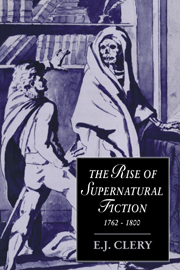Crossref Citations
This Book has been
cited by the following publications. This list is generated based on data provided by Crossref.
Hogle, Jerrold E.
1998.
Bram Stoker.
p.
205.
Hogle, Jerrold E.
1998.
The gothic ghost as counterfeit and its haunting of romanticism: The case of “frost at midnight”.
European Romantic Review,
Vol. 9,
Issue. 2,
p.
283.
Gamer, Michael
1999.
Genres for the Prosecution: Pornography and the Gothic.
PMLA/Publications of the Modern Language Association of America,
Vol. 114,
Issue. 5,
p.
1043.
Lessenich, Rolf
1999.
Frauen Literatur Geschichte.
p.
191.
McCann, Andrew
1999.
Cultural Politics in the 1790s.
p.
107.
Cornwell, Neil
1999.
Ghost-Writers in the Sky (and Elsewhere): Notes Towards a Spectropoetics of Ghosts and Ghostliness.
Gothic Studies,
Vol. 1,
Issue. 2,
p.
156.
Whatley, John
1999.
Romantic and Enlightened Eyes in the Gothic Novels of Percy Bysshe Shelley.
Gothic Studies,
Vol. 1,
Issue. 2,
p.
201.
Comaroff, Jean
and
Comaroff, John L.
2000.
Millennial Capitalism: First Thoughts on a Second Coming.
Public Culture,
Vol. 12,
Issue. 2,
p.
291.
Grenby, M. O.
2001.
The Anti-Jacobin Novel.
Purinton, Marjean D.
2001.
Byron's disability and the techno‐gothic grotesque inthe deformed transformed.
European Romantic Review,
Vol. 12,
Issue. 3,
p.
301.
Schmidgen, Wolfram
2002.
Eighteenth-Century Fiction and the Law of Property.
Breitinger, Eckhard
Horatschek, Anna-M.
Strasen, Sven
Freiburg, Rudolf
Thielmann, Pia
Meier, Nicole
Nieragden, Göran
Zerweck, Bruno
Riemenschneider, Dieter
Binder, Wolfgang
Humphrey, Richard
Fischer-Seidel, Therese
Thies, Henning
Nischik, Reingard M.
Jarfe, Günther
Müller, Wolfgang G.
Glaap, Albert-Reiner
Schnitker, Jan
Collier, Gordon
Grabes, Herbert
Petzold, Dieter
Herzogenrath, Bernd
Degenring, Folkert
Imhof, Rüdiger
Keinen, Sandra
Hanke, Michael
Allrath, Gaby
Henke, Christoph
Rauter, Susanne
Marsden, Peter H.
Scheiding, Oliver
Baumann, Uwe
Schlaeger, Jürgen
Berns, Ute
Höfele, Andreas
Huber, Werner
Nünning, Vera
Nünning, Ansgar
Hertel, Kirsten
Rohloff, Heide N.
Welz, Stefan
Leypoldt, Günter
Stock, Angela
Kreutzer, Eberhard
Lessenich, Rolf
Berensmeyer, Ingo
Blaicher, Ria
Löschnigg, Maria
Stratmann, Gerd
Habermann, Ina
Kuester, Martin
Bader, Rudolf
Krewani, Angela
Schneider, Ralf
Schöneich, Christoph
Glaser, Marlies
Schäffner, Raimund
Reckwitz, Erhard
Gymnich, Marion
Sternberg, Claudia
Schwend, Joachim
Löffler, Arno
Heinen, Sandra
Lengeier, Rainer
Mergenthal, Silvia
Hollm, Jan
Meier, Franz
Späth, Eberhard
Nover, Peter
Gassenmeier, Michael
Swift, Astrid
Horstmann, Ulrich
von Koppenfels, Werner
Rippl, Gabriele
Zwierlein, Anne-Julia
Lennartz, Norbert
Meinig, Sigrun
Kosok, Heinz
Middeke, Martin
Döring, Tobias
Niederhoff, Burkhard
Kienzle, Ursula Dora
Müller-Wood, Anja
Schenkel, Elmar
Erzgräber, Willi
Reichl, Susanne
Feuchert, Sascha
Mader, Doris
Jaeger, Stephan
Schmidt, Johann N.
Schnierer, Peter Paul
Link, Viktor
Lenz, Bernd
Kramer, Jürgen
Krieger, Gottfried
Roggendorf, Simone
Stein, Mark
Simonis, Annette
Starck, Kathleen
Schnackertz, Hermann Josef
Neumann, Fritz-Wilhelm
Wolf, Philipp
Kotte, Christina
Volkmann, Laurenz
Glage, Liselotte
Foltinek, Herbert
Voigts-Virchow, Eckart
Mehl, Dieter
Zwernemann, Jens
Müller-Zettelmann, Eva
Bonacker, Maren
Nieragden, Göran
Himberg, Kay
Jung, Sandro
Seeber, Hans Ulrich
Berger, Dieter A.
Stummer, Peter
Irmscher, Christoph
Egbert, Marie-Luise
Seibel, Ralph M.
Krings, Constanze
Buchholz, Sabine
Jahn, Manfred
Horlacher, Stefan
Spies, Marion
Bach, Susanne
Rix, Walter T.
Sims, Dagmar
Davis, Geoffrey V.
Schülting, Sabine
Kullmann, Thomas
Zagratzki, Uwe
Sander, Hans Jochen
Ahrens, Rüdiger
Cujai, Nicole
Schmitz, Götz
Hühn, Peter
Böhnke, Dietmar
Groß, Konrad
Hilf, Susanne
Fludernik, Monika
Korte, Barbara
Broich, Ulrich
Müller, Klaus Peter
Hühn, Peter
Simonis, Linda
Zacharasiewicz, Waldemar
Prießnitz, Horst
Weber, Alexander
Andrassy, Antje
Peters, Christoph M.
Glaser, Brigitte
Stein, Thomas Michael
Petry, Mike
Potzner, Stefan
Viol, Claus-Ulrich
Ottlinger, Claudia
Löschnigg, Martin
Kramer, Stephanie
Borgmeier, Raimund
Sommer, Roy
Müller-Oberhäuser, Gabriele
Rommel, Thomas
Renger, Nicola
Zerpner, Annette
Gehrig, Susanne
Klooß, Wolfgang
Hertel, Ralf
Winkgens, Meinhard
Mittelbach, Jens
Haas, Alexandra
Bücher, Britta
Kross, Meike
Schulze-Engler, Frank
Pfandl-Buchegger, Ingrid
Hoven, Heribert
Bauer, Matthias
Stierstorfer, Klaus
Mosthaf, Franziska
Klein, Bernhard
Johnston, Andrew James
Rubik, Margarete
Ahrends, Günter
Beck, Rudolf
Meyer, Michael
Peters, Susanne
Schilken, Dörthe
Simatei, Peter
Lange, Bernd-Peter
Klein, Holger
Höltgen, Karl Josef
Müller, Markus
Erll, Astrid
Surkamp, Carola
Müllenbrock, Heinz-Joachim
Erney, Hans-Georg
Pointner, Frank
Schruff, Renate
Mettinger-Schartmann, Elke
Frodl, Aglaja
Glomb, Stefan
Real, Hermann J.
Binias, Silke
Pointner, Petra
Schmid, Susanne
Volk-Birke, Sabine
Lethbridge, Stefanie
Hagenauer, Sabine
Seibel, Klaudia
Gehring, Wolfgang
Karrer, Wolfgang
Spekat, Susanne
Orth, Eva-Maria
Berndt, Katrin
Stegmann, Annegret
Unterweg, Friedrich-K.
and
Schabio, Saskia
2002.
Metzler Lexikon Englischsprachiger Autorinnen und Autoren.
p.
1.
Wolfreys, Julian
2002.
Victorian Hauntings.
p.
25.
Fitzgerald, Lauren
2003.
Crime, Punishment, Criticism: The Monk as Prolepsis.
Gothic Studies,
Vol. 5,
Issue. 1,
p.
43.
Whatley, John
2003.
Introduction: ‘of cult-like and occult undertaking’.
Gothic Studies,
Vol. 5,
Issue. 1,
p.
1.
BROWN, MARSHALL
2003.
Frankenstein:A Child’s Tale.
Novel,
Vol. 36,
Issue. 2,
p.
145.
Whatley, John
2003.
‘The ghost of a forgotten form of sleep’: The Gothic in Shelley's ‘The Triumph of Life’.
Gothic Studies,
Vol. 5,
Issue. 1,
p.
71.
Fitzgerald, Lauren
2004.
Female Gothic and the Institutionalization of Gothic Studies.
Gothic Studies,
Vol. 6,
Issue. 1,
p.
8.
Perry, Ruth
2004.
Novel Relations.
Allen, Emily
and
Felluga, Dino Franco
2004.
Jane Eyre: Now and Forever; or, the Strange Afterlife of Gothic.
Romanticism on the Net,





